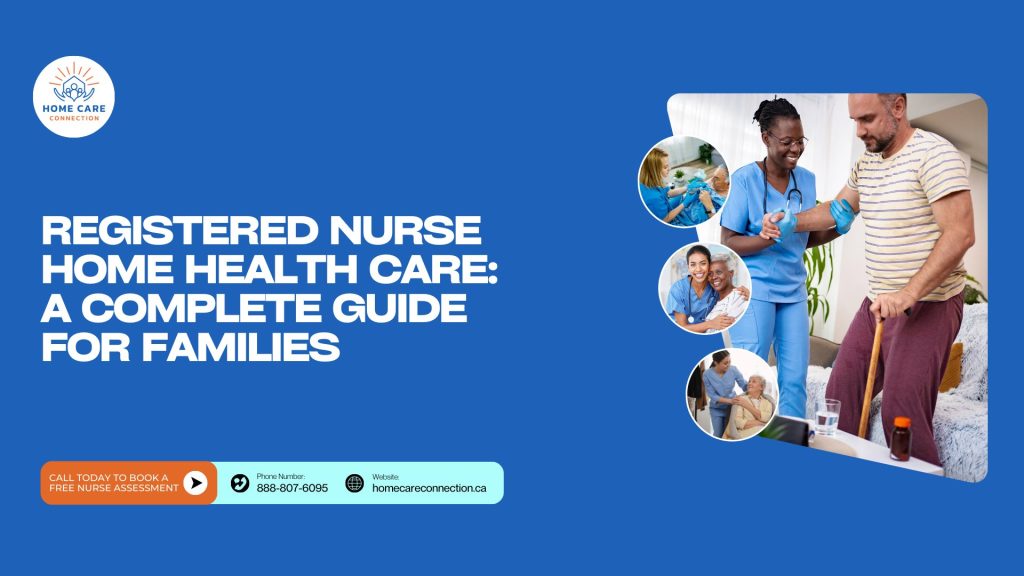Registered Nurse Home Health Care: A Complete Guide for Families
A registered nurse (RN) brings professional medical care directly into the home. Families rely on RNs to provide health assessments, wound care, medication management, and ongoing support after hospital stays. By receiving care services at home, patients benefit from a familiar environment while still accessing skilled medical expertise.
Many families in Ontario are turning to home health care as an alternative to nursing homes. With nursing care available in the comfort of your home, patients maintain independence while family caregivers gain peace of mind. This comprehensive guide explains the role of RNs in home care, the benefits of private nursing, and when families should consider this option.
What Does a Registered Nurse Do in Home Health Care?

A nurse in home health care delivers skilled medical support to patients who need more than personal assistance. Unlike Personal Support Workers (PSWs) or companion caregivers, RNs provide professional care rooted in clinical training.
Home care services provide:
- Monitoring vital signs and creating a care plan accordingly
- Medication management to prevent errors and complications
- Wound care and post-surgical support to encourage healing
- Education for family caregivers to improve confidence in daily routines
By offering this spectrum of care, RNs ensure patients can safely remain at home, avoid unnecessary hospital readmissions, and improve their quality of life.
Roles and Responsibilities of Nurses in Home Care

RNs adapt to different care needs depending on the individual’s health concerns and medical history. Their services offer both medical treatment and family support.
Skilled nursing services include:
- Chronic condition management for diabetes, dementia, and heart disease
- Preventive checks that detect issues early and adjust services as needs evolve
- Palliative care and respite care for families managing long-term illnesses
- Support for daily living by coordinating with doctors and other care providers
This range of services makes in-home nursing flexible and responsive to changing circumstances.
Benefits of Hiring a Nurse for Care at Home
Choosing a registered nurse for home care offers unique advantages compared to other care options.
- Personalized care plans: Each care plan is tailored to meet the unique needs of the patient.
- Comfort of your home: Healing happens in familiar surroundings, which supports both physical and emotional well-being.
- Support for family caregivers: Families gain relief through respite and shared responsibility.
- Reduced risks: Ongoing monitoring lowers the chance of complications, falls, or infections.
- Independence: Many seniors can continue aging in place with the right nursing support.
By combining clinical skills with compassionate care, nurses strengthen both health outcomes and family bonds.
Comparing RNs with Other Care Options
Not all care services offer the same level of care. Here’s how RNs differ from other care providers:
- Registered Nurse vs. Personal Support Worker (PSW): RNs manage complex medical needs like wound care, while PSWs focus on personal care such as bathing, dressing, and help with daily activities.
- Registered Nurse vs. Nursing Homes: Nursing homes provide 24/7 oversight, but many families prefer care at home for comfort, privacy, and continuity of care.
- Registered Nurse vs. Companion Care: Companion care focuses on emotional support and companionship, while RNs provide specialized care for ongoing medical conditions.
For patients who may require specialized medical attention, a registered nurse at home bridges the gap between daily assistance and hospital-level services.
When Should Families Consider Hiring a Home Health Nurse?

Families should explore nursing care at home when:
- Recovery after surgery or hospital discharge requires skilled support
- Family caregivers feel overwhelmed by complex routines or medical tasks
- A loved one is living with dementia or Alzheimer’s disease and needs ongoing monitoring
- Preventing hospital readmissions becomes a priority
Having a nurse oversee medication management, create a comprehensive care plan, and coordinate with physicians ensures the best possible care for patients who want to stay in the surroundings of their own homes.
Conclusion: Choosing the Right Care for Your Loved One
Hiring a nurse for home health care allows families to receive comprehensive support without leaving the comfort of their home environment. With experience in both medical care and providing emotional support, RNs help patients maintain independence and dignity while improving overall care quality.
By investing in care at home, families can make informed decisions that balance medical needs, safety, and emotional well-being. When you choose to bring in licensed healthcare professionals, you give your loved one not only professional medical care but also the chance to enjoy life with greater security and comfort.
Frequently Asked Questions
What is the role of a nurse in home health care?
A nurse provides skilled nursing services like medication management, wound care, and health monitoring at home. Their training allows them to manage complex medical needs and support recovery.
Why are families choosing home care over nursing homes?
Many families prefer home care services because they keep loved ones in familiar surroundings while ensuring high-quality medical support. This approach also allows for stronger connections between families and caregivers.
How do nurses support patient recovery at home?
RNs monitor health changes, deliver rehabilitation services, and coordinate with doctors to ensure smooth care delivery. They also guide family caregivers on proper routines.
What are the benefits of hiring a nurse for home care?
Benefits include lower hospital readmission risks, personalized care plans, and improved quality of life for patients receiving care in the comfort of their home.
When should families hire a nurse?
Consider hiring a nurse when care requirements go beyond what families can manage. This includes post-surgical recovery, chronic illness management, and respite care for family caregivers.
How do nurses differ from PSWs?
PSWs mainly help with activities of daily living, while nurses deliver professional medical support such as medication and wound care.
Do I need a care assessment before starting home health care?
Yes, a care coordinator or nurse will assess your loved one’s health concerns and create a comprehensive plan tailored to their care needs.






